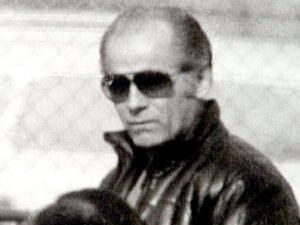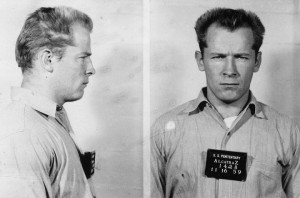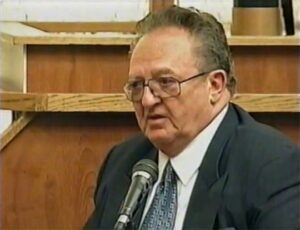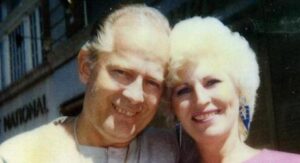 On June 6, Boston will hold organized crime’s, “Trial of the Century,” when infamous Mob boss James “Whitey” Bulger gets his day in court for allegedly murdering 19 people during his stay atop Boston’s gangland. After 16 years on the FBI’s Top 10 Most Wanted list, Bulger was apprehended on June 22, 2011 in Santa Monica, California. Since his capture, the families of his alleged victims, as well as Boston law enforcement officials have eagerly anticipated justice being served. “It should be a great show,” George Hassett, a Boston journalist and author of Gangsters of Boston says. “Whitey insists he will testify. His longtime partners in crime turned informants, such as John Martorano and Kevin Weeks will also likely make an appearance on the witness stand. It will be one final reunion for the gang. The only one not there will be the only one who didn’t turn informant- the cop, FBI agent John Connolly.”
On June 6, Boston will hold organized crime’s, “Trial of the Century,” when infamous Mob boss James “Whitey” Bulger gets his day in court for allegedly murdering 19 people during his stay atop Boston’s gangland. After 16 years on the FBI’s Top 10 Most Wanted list, Bulger was apprehended on June 22, 2011 in Santa Monica, California. Since his capture, the families of his alleged victims, as well as Boston law enforcement officials have eagerly anticipated justice being served. “It should be a great show,” George Hassett, a Boston journalist and author of Gangsters of Boston says. “Whitey insists he will testify. His longtime partners in crime turned informants, such as John Martorano and Kevin Weeks will also likely make an appearance on the witness stand. It will be one final reunion for the gang. The only one not there will be the only one who didn’t turn informant- the cop, FBI agent John Connolly.”
Bulger’s history as the leader of the Winter Hill Gang, an Irish crime family that grew out of his Southie neighborhood in Boston, is well known, as is his role as a top echelon FBI informant, who operated with lawless impunity for 20 years, under the protection of his FBI handler, Agent Connolly. The result was free reign for Bulger and top associate Stephen “The Rifleman” Flemmi, to manipulate Boston’s underworld to suit their own purposes and advance their own criminal enterprise ahead of La Cosa Nostra’s, the feds often turning a blind eye and even encouraging the murders of rival Mafia and recognized crime figures. “People are wondering, who can Whitey give up in the FBI? The Boston police? The state police?” Hassett says. “If he does have law enforcement corruption to reveal, most of it would be barred by the statute of limitation. If Whitey told all, could he solve any of Boston’s gangland mysteries such as the Black Francis Massacre? The art heist of a Rembrandt painting at The Isabella Stewart Gardner Museum on Huntington Avenue?” Questions that could be answered when Bulger takes the stand during his trial.
 Few names have resonated more or been better associated with Boston than Bulger’s. “Whitey is notorious for many reasons- he did time at Alcatraz, survived the Irish gang wars, corrupted J. Edgar Hoover’s supposedly incorruptible FBI, became a Robin Hood figure to a South Boston neighborhood reeling from the school busing crisis of 1970,” Hassett says. “But most important is the fact that his brother happened to be the most powerful man in Massachusetts for many years, State Senate President Bill Bulger. That’s just an accident of birth. Whitey is not a criminal mastermind, just a bully who understood how to manipulate others.”
Few names have resonated more or been better associated with Boston than Bulger’s. “Whitey is notorious for many reasons- he did time at Alcatraz, survived the Irish gang wars, corrupted J. Edgar Hoover’s supposedly incorruptible FBI, became a Robin Hood figure to a South Boston neighborhood reeling from the school busing crisis of 1970,” Hassett says. “But most important is the fact that his brother happened to be the most powerful man in Massachusetts for many years, State Senate President Bill Bulger. That’s just an accident of birth. Whitey is not a criminal mastermind, just a bully who understood how to manipulate others.”
Still, Whitey will forever be mentioned in the same breath as Al Capone, Pablo Escobar and John Gotti, the other gangster legends of the twenty first century. That much is certain. Locked away in Plymouth County House of Corrections, the 83-year-old Bulger has been the toast of the town and highlight of local talk radio shows, as his day of judgment approaches. While awaiting his fate Whitey has spent time communicating with his family, preparing his defense with lawyers and speaking with actors like Mark Wahlberg and Johnny Depp about possible movie deals. “When Whitey was first captured, many people in Boston compared it to the Red Sox winning the World Series in 2004,” Hassett says. “We couldn’t believe it happened. We figured he was dead or the FBI didn’t want to find him. The bombing of the Boston Marathon obviously is the big local story now but Whitey’s court appearances are still news.” The crown prince of Boston’s underworld has returned and the media can’t get enough of him.
The trial, which is expected to end sometime between Labor Day and mid-September has received a tremendous amount of publicity. At least 48 national and local media outlets have expressed interest in covering the trial, but due to space limitations, only 15 members of the media will have the opportunity to watch the trial unfold in real time. The rest of the world will depend on the media to act as its surrogate. In an effort to seat an impartial jury to decide the fate of the notorious gangster, lawyers for both sides have submitted an extensive list of proposed questions to pose to potential jurors including the following, “Based upon any books, movies, or newspaper/magazine/Internet articles you have read regarding organized crime in Boston, have you formed an opinion regarding James ‘Whitey’ Bulger or federal law enforcement that would prevent you from being a fair and impartial juror in this case?” Lawyers have pointed out that it will be hard to find someone who has not heard of Whitey in the jury pool.
 The government witness list includes several former Bulger allies- Patrick Nee, Kevin Weeks and John Martorano- who have authored best-selling books that outlined their true crime escapades with Bulger and the Irish mob. Flemmi, Bulger’s former informant-in-crime, is also expected to testify. Flemmi remains imprisoned for 10 murders, in a little know Witness Protection Program for prisoners, while Weeks and Martorano are both free after serving their sentences. Martorano admitted murdering 20 people and spent 12 years behind bars. Weeks admitted to helping Bulger and Flemmi kill five people. “His partner in crime and fellow informant Stephen Flemmi’s location is not made available by the Bureau of Prisons,” Hassett says. “However, Flemmi is rumored to be in the prison at Otisville, New York. A quick jump to Boston. Departments such as the state police and DEA who tried to get Whitey and failed, due to Whitey’s corrupt team of FBI agents, are eager, in their more honest moments, to see not only Whitey punished but the FBI exposed. The FBI undermined investigations into Whitey for years, to the point where witnesses were killed.” It’s time for the scales of justice to be balanced.
The government witness list includes several former Bulger allies- Patrick Nee, Kevin Weeks and John Martorano- who have authored best-selling books that outlined their true crime escapades with Bulger and the Irish mob. Flemmi, Bulger’s former informant-in-crime, is also expected to testify. Flemmi remains imprisoned for 10 murders, in a little know Witness Protection Program for prisoners, while Weeks and Martorano are both free after serving their sentences. Martorano admitted murdering 20 people and spent 12 years behind bars. Weeks admitted to helping Bulger and Flemmi kill five people. “His partner in crime and fellow informant Stephen Flemmi’s location is not made available by the Bureau of Prisons,” Hassett says. “However, Flemmi is rumored to be in the prison at Otisville, New York. A quick jump to Boston. Departments such as the state police and DEA who tried to get Whitey and failed, due to Whitey’s corrupt team of FBI agents, are eager, in their more honest moments, to see not only Whitey punished but the FBI exposed. The FBI undermined investigations into Whitey for years, to the point where witnesses were killed.” It’s time for the scales of justice to be balanced.
In a bizarre twist, Bulger is now saying that he was never actually an FBI informant. “The government has long maintained the fiction that James Bulger was an informant for the FBI,” Bulger’s attorney, JW Carney Jr. wrote in court papers, claiming that no FBI annual informant reports with Bulger’s name on them cannot be produced. “If no such reports exist, then their absence directly undermines the government’s claim that James Bulger was an informant.” Bulger’s lawyer is a well-known criminal defense attorney, who regularly takes big federal cases. He recently defended a Sudbury, Massachusetts man accused of communicating with foreign terror cells.
The defense has already scored one major legal victory. “A federal appeals court removed Judge Richard Stearns from the trial to avoid the perception of bias,” Hassett says. “Stearns was a federal prosecutor in Boston during the same time Whitey was an informant and Carney argued for him to step down.” The trial presents one final opportunity for Bulger to talk his way out of trouble. Through his attorney, Bulger has said he will take the stand and testify that a former US Attorney, the now deceased Jeremiah O’Sullivan, granted him prospective immunity from prosecution for his crimes, up to and including murder.
“Whitey’s lawyers have not been able to get their defense theory past a judge,” Hassett says. “Their claim is Whitey was given immunity from O’Sullivan, even for murder. Their attempts to present this to a jury have been rejected by judges thus far.” Judge Denise Casper, who replaced Stearns, threw up her own roadblock to the immunity claim, “Any alleged immunity agreement… is a bar to prosecution to be determined by the court and not a defense to the crimes charged.” Prosecutors have called Bulger’s immunity claim absurd. “Mr. Bulger doesn’t think he has immunity,” assistant US Attorney Brian Kelly said. “If he thought he had immunity, he’d move to dismiss the indictment.”
But Carney contends that Bulger has a right to have a jury, and not a judge, decide whether he had immunity based on constitutional law, case law and Supreme Court rulings. “We are confident that if the judge does not permit a jury to make this decision, any conviction that results will be reversed,” Carney said. “We would like to avoid that.” It seems like another chess move in the long line of games that Bulger has played. But at this point it seems Whitey is played out. No jury would dare believe that a prosecutor would seemingly grant someone blanket immunity to carry out crimes such as murder, and that the immunity was granted retroactively. But is the alleged defense just a smokescreen thrown up by Bulger to mask his real tactics at trial? A master at gamesmanship, Bulger has long fomented confusion in the minds of the public and law enforcement over where the FBI’s crimes stopped and his started. With all the misdirection, could a final checkmate be in sight?
It’s been reported that the clean-shaven, trimmer looking Bulger is in bad health, but local papers have said that he appeared alert in his recent court hearings. “Whitey was said to have had a health scare recently,” Hassett says. “He is known to be a health and fitness nut though.” Facing his biggest test ever, it is yet to be seen if Whitey is up to the challenge, or if he will fold in the face of the insurmountable adversity that is confronting him. At 83-years-old, is he simply tired of it all and ready to lie down? Or is there one more gambit left for the Irish rogue-slash-psychopath?
 After a lifetime of being involved in murder, extortion, drug trafficking and organized crime it seems the end is near for Bulger. But he can take solace in the fact that at least one of his closest companions, Catherine Greig, his endearing gun moll, who was on the run with him during his fugitive years, didn’t turn on him as all his other one time accomplices have. “Catherine Greig was sentenced to 8-10 years,” Hassett says. “After sentencing she reaffirmed her devotion to Whitey and expressed that she had no regrets.” Whatever the outcome of Whitey’s trial, it will add another chapter to his legacy in the chronicles of popular culture and gangster lore. Will justice finally be served?
After a lifetime of being involved in murder, extortion, drug trafficking and organized crime it seems the end is near for Bulger. But he can take solace in the fact that at least one of his closest companions, Catherine Greig, his endearing gun moll, who was on the run with him during his fugitive years, didn’t turn on him as all his other one time accomplices have. “Catherine Greig was sentenced to 8-10 years,” Hassett says. “After sentencing she reaffirmed her devotion to Whitey and expressed that she had no regrets.” Whatever the outcome of Whitey’s trial, it will add another chapter to his legacy in the chronicles of popular culture and gangster lore. Will justice finally be served?


